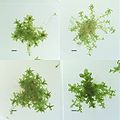Cryopreservation
Cryopreservation is a process where cells, whole tissues, or any other substances susceptible to damage caused by chemical reactivity or time are preserved by cooling to sub-zero temperatures. At low enough temperatures, any enzymatic or chemical activity which might cause damage to the material in question is effectively stopped. Cryopreservation methods seek to reach low temperatures without causing additional damage caused by the formation of ice during freezing.
Process
The process of cryopreservation entails freezing the materials to be preserved, and storing them at very low temperatures, typically that of liquid nitrogen (-196 degrees Celsius). The materials can then be safely stored for an extended period of time, and later thawed and revived without significant loss of their original structure or functionality.
Uses
Cryopreservation is used in a variety of fields. In medicine, it is used to preserve sperm and eggs in fertility treatments, stem cells for regenerative medicine, and organs for transplantation. In plant biology, it is used to preserve seeds and plant tissues for conservation purposes. In research, it is used to preserve biological samples for later analysis.
Techniques
There are several techniques used in cryopreservation, including slow freezing, vitrification, and freeze-drying. Each technique has its own advantages and disadvantages, and the choice of technique depends on the type of material being preserved and the intended use of the preserved material.
Risks and Challenges
While cryopreservation is a powerful tool, it is not without its risks and challenges. The process of freezing and thawing can cause damage to cells and tissues, and not all materials survive the process intact. There is also the risk of contamination during storage and thawing. Furthermore, the long-term effects of cryopreservation on the functionality of cells and tissues are not fully understood.
See Also
Transform your life with W8MD's budget GLP-1 injections from $125.
W8MD offers a medical weight loss program to lose weight in Philadelphia. Our physician-supervised medical weight loss provides:
- Most insurances accepted or discounted self-pay rates. We will obtain insurance prior authorizations if needed.
- Generic GLP1 weight loss injections from $125 for the starting dose.
- Also offer prescription weight loss medications including Phentermine, Qsymia, Diethylpropion, Contrave etc.
NYC weight loss doctor appointments
Start your NYC weight loss journey today at our NYC medical weight loss and Philadelphia medical weight loss clinics.
- Call 718-946-5500 to lose weight in NYC or for medical weight loss in Philadelphia 215-676-2334.
- Tags:NYC medical weight loss, Philadelphia lose weight Zepbound NYC, Budget GLP1 weight loss injections, Wegovy Philadelphia, Wegovy NYC, Philadelphia medical weight loss, Brookly weight loss and Wegovy NYC
|
WikiMD's Wellness Encyclopedia |
| Let Food Be Thy Medicine Medicine Thy Food - Hippocrates |
Medical Disclaimer: WikiMD is not a substitute for professional medical advice. The information on WikiMD is provided as an information resource only, may be incorrect, outdated or misleading, and is not to be used or relied on for any diagnostic or treatment purposes. Please consult your health care provider before making any healthcare decisions or for guidance about a specific medical condition. WikiMD expressly disclaims responsibility, and shall have no liability, for any damages, loss, injury, or liability whatsoever suffered as a result of your reliance on the information contained in this site. By visiting this site you agree to the foregoing terms and conditions, which may from time to time be changed or supplemented by WikiMD. If you do not agree to the foregoing terms and conditions, you should not enter or use this site. See full disclaimer.
Credits:Most images are courtesy of Wikimedia commons, and templates, categories Wikipedia, licensed under CC BY SA or similar.
Contributors: Prab R. Tumpati, MD




